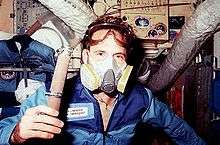Vika oxygen generator
Vika or TGK is an oxygen generating system for spaceflight.[1] It is a SFOG, or solid-fuel oxygen generator, a kind of chemical oxygen generator.[1] It has been used on the retired Mir space station and the International Space Station.[1] It was originally developed by Roscosmos to supplement the Elektron oxygen system on Mir.[1] A Vika module, also known as a "candle", contains about one liter of lithium perchlorate and can provide oxygen for one person for 24 hours.[1]
After being adopted for use on the ISS, it had the NASA name SFOG, but they also sometimes use the Russian acronym TGK.[1]
Vika on Mir

Vika was used on Mir when more than three people were on board.[2] Vika needs a supply of canisters to work, which must be flown into space.[2] An example of this is Progress M-34, which carried 60 canisters to Mir in 1997 along with other cargo.[2] If Vika and Elektron stopped working, the station would have to rely on a limited supply of bottled oxygen.[2]
The fire was a “raging blowtorch" ..
—Mir crewmember onboard during the fire[1]
In February 1997 a Vika chemical oxygen generator failed on Mir. It caught fire and spewed a torch-like jet of a molten metal and sparks across one of the Mir space station modules, burning for around 14 minutes and blocking the escape route to the docked Soyuz spacecraft.[1] The fire was eventually put out, and the crew was not harmed.[1] A definitive cause to the accident was not determined because the fire destroyed the device, but it was suspected that a torn piece of rubber glove worn during assembly likely contaminated the canister.[1] Despite this incident, NASA decided it was still the best supplemental oxygen system available and supported its use on the then upcoming ISS.[1] However the U.S. and Russia worked together to improve the safety of the system before using it on the new space station.[1]
Vika on ISS
A backup to the temperamental Elektron system used on both the ISS and Mir is the Vika solid-fuel oxygen generator (SFOG), which contains a replaceable cartridge – a thin-walled steel tube with a three-part block of oxygen-releasing mixture based on lithium perchlorate. Two parts are tablets of the chemical mixture and the third one is the igniter tablet with a flash igniter. The igniter is struck by a firing pin when the device is activated. One cartridge releases 600 litres (160 US gal) of oxygen and burns for 5–20 minutes at 450–500 °C (842–932 °F).[3] The oxygen is cooled and filtered from dust and odours, and released into the space station atmosphere.
See also
References
External links
- File:Environmental.pdf (this has a small picture of an SFOG on the bottom left)
- SFOG Lessons Learned